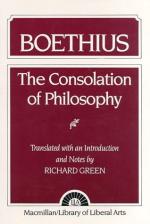|
This section contains 1,787 words (approx. 6 pages at 300 words per page) |

|
SOURCE: "Chapter XXXIX," in The Decline and Fall of the Roman Empire, Vol. II, edited by J. B. Bury, The Heritage Press, 1946, pp. 1226-249.
Gibbon 's monumental The Decline and Fall of the Roman Empire, written between 1776 and 1788, is recognized as the finest work of history in the English language and a seminal text in eighteenth-century thought. In the following excerpt from that work, Gibbon appraises Boethius as "the last of the Romans whom Cato or Tully could have acknowledged for their countryman."
The senator Boethius is the last of the Romans whom Cato or Tully could have acknowledged for their countryman. As a wealthy orphan, he inherited the patrimony and honours of the Anician family, a name ambitiously assumed by the kings and emperors of the age; and the appellation of Manlius asserted his genuine or fabulous descent from a race of consuls and dictators, who had...
|
This section contains 1,787 words (approx. 6 pages at 300 words per page) |

|


